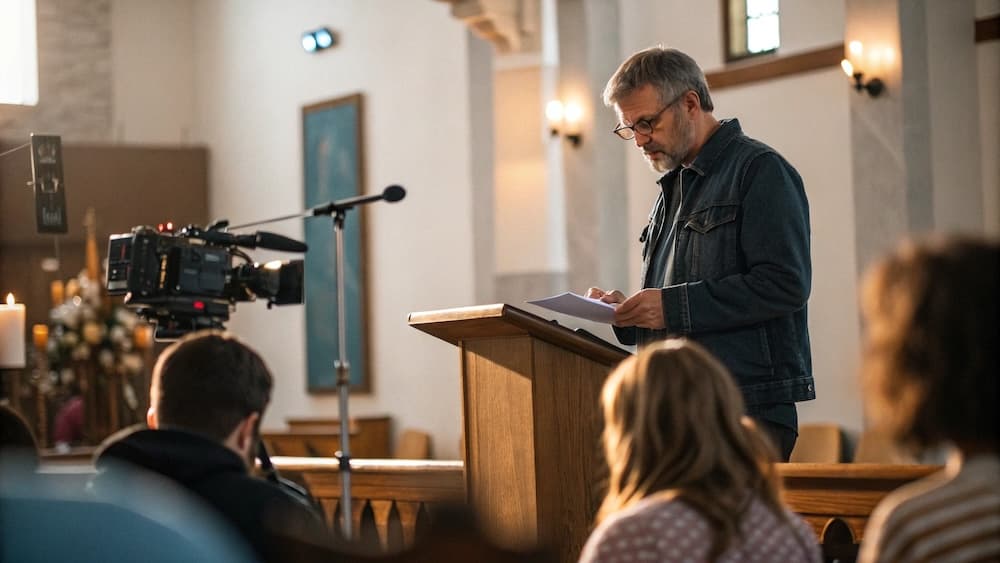3 Ways Your Church is Self-Destructing

Many churches permanently close their doors every year.
Depending upon your source, conservative estimates indicate that 4,000 churches cease to exist every year, whereas others suggest up to 10,000.
Why do so many churches close every year?
Why does the fire of passion for reaching people with the gospel of Jesus Christ get extinguished?
There are many reasons why churches close their doors, but from 1 Corinthians 12, you will discover three ways your church is self-destructing.
#1. You don’t believe in the church
“For we were all baptized by one Spirit so as to form one body — whether Jews or Gentiles, slave or free — and we were all given the one Spirit to drink” (1 Cor. 12:13).
In the United States, the unchurched population continues to grow. Within this growing population, there is an increasing segment of people who “love Jesus but not the church.”
In a recent survey conducted by the Barna Group, they discovered that many Americans who have rejected the institutional church had not rejected their faith in Christ. Instead of participating in the life of a local church, this segment of the population maintains an orthodox view of Christianity, strives to live and love like Jesus, and seeks to keep a form of Christian community.
Even though the individuals who make up this segment have legitimate concerns, and perhaps bad experiences with a local church, this is not reason enough to give up on the church.
The church is not a new concept.
The church was established by Jesus Christ.
Jesus has persevered the church for nearly 2,000 years, he is building his church today, and he will continue to work through his church until he returns.
The church is full of imperfect people who believe in a perfect Savior. The church had significant issues when it was first created, which you can read all about throughout the New Testament, and the church will continue to have problems.
Despite the problems the church faces internally, Jesus still loves his church. He lived for her. He died for her. And he will return for her one day soon.
#2. You are not a part of the church
“Now if the foot should say, ‘Because I am not a hand, I do not belong to the body’” (1 Cor. 12:15).
Do you believe your church does not need you? Do you feel unimportant?
If you have placed your faith in Jesus Christ, then you are a member of the body of Christ. As a member of the body of Christ, you are needed as a part of his body.
Regardless of what you think you have to offer, you have a lot to offer as a member of the body of Christ. The other members of the church you are involved with need you to fulfill your unique calling within his body.
There are times in the life of any Christian when he or she may need to take an extended rest from volunteering or vocational ministry. But, as a believer in Christ, you are a part of his body, and you have an important role to play.
#3. You discourage others from getting involved in the church
“The eye cannot say to the hand, ‘I don’t need you!’” (1 Cor. 12:21).
Is it easy or difficult for people to get involved with your church? Have you created systems and lead people to only fill the positions you have created? Or, do you have staff or volunteers who try to do everything him or herself?
People can easily be indirectly discouraged from participating in the life of your church. Some churches have established programs and ministries that require a certain number and type of volunteer. So, if someone does not fit this criterion, then he or she will be indirectly discouraged from getting involved.
Now, other churches will directly discourage people from visiting their church or even volunteer. Instead of reflecting the open arms of Jesus, these churches cross their arms, build invisible walls, and discourage people from hearing the gospel.
There are times when this will happen in the life of a church on purpose or accidentally over the years. Either way, this type of behavior is sinful and can lead a church down a path of nonexistence if not repented from and redirected.
What are other ways a church can self-destruct? Share your thoughts in the comments below.
Sign Up for Product Updates
Many churches permanently close their doors every year.
Depending upon your source, conservative estimates indicate that 4,000 churches cease to exist every year, whereas others suggest up to 10,000.
Why do so many churches close every year?
Why does the fire of passion for reaching people with the gospel of Jesus Christ get extinguished?
There are many reasons why churches close their doors, but from 1 Corinthians 12, you will discover three ways your church is self-destructing.
#1. You don’t believe in the church
“For we were all baptized by one Spirit so as to form one body — whether Jews or Gentiles, slave or free — and we were all given the one Spirit to drink” (1 Cor. 12:13).
In the United States, the unchurched population continues to grow. Within this growing population, there is an increasing segment of people who “love Jesus but not the church.”
In a recent survey conducted by the Barna Group, they discovered that many Americans who have rejected the institutional church had not rejected their faith in Christ. Instead of participating in the life of a local church, this segment of the population maintains an orthodox view of Christianity, strives to live and love like Jesus, and seeks to keep a form of Christian community.
Even though the individuals who make up this segment have legitimate concerns, and perhaps bad experiences with a local church, this is not reason enough to give up on the church.
The church is not a new concept.
The church was established by Jesus Christ.
Jesus has persevered the church for nearly 2,000 years, he is building his church today, and he will continue to work through his church until he returns.
The church is full of imperfect people who believe in a perfect Savior. The church had significant issues when it was first created, which you can read all about throughout the New Testament, and the church will continue to have problems.
Despite the problems the church faces internally, Jesus still loves his church. He lived for her. He died for her. And he will return for her one day soon.
#2. You are not a part of the church
“Now if the foot should say, ‘Because I am not a hand, I do not belong to the body’” (1 Cor. 12:15).
Do you believe your church does not need you? Do you feel unimportant?
If you have placed your faith in Jesus Christ, then you are a member of the body of Christ. As a member of the body of Christ, you are needed as a part of his body.
Regardless of what you think you have to offer, you have a lot to offer as a member of the body of Christ. The other members of the church you are involved with need you to fulfill your unique calling within his body.
There are times in the life of any Christian when he or she may need to take an extended rest from volunteering or vocational ministry. But, as a believer in Christ, you are a part of his body, and you have an important role to play.
#3. You discourage others from getting involved in the church
“The eye cannot say to the hand, ‘I don’t need you!’” (1 Cor. 12:21).
Is it easy or difficult for people to get involved with your church? Have you created systems and lead people to only fill the positions you have created? Or, do you have staff or volunteers who try to do everything him or herself?
People can easily be indirectly discouraged from participating in the life of your church. Some churches have established programs and ministries that require a certain number and type of volunteer. So, if someone does not fit this criterion, then he or she will be indirectly discouraged from getting involved.
Now, other churches will directly discourage people from visiting their church or even volunteer. Instead of reflecting the open arms of Jesus, these churches cross their arms, build invisible walls, and discourage people from hearing the gospel.
There are times when this will happen in the life of a church on purpose or accidentally over the years. Either way, this type of behavior is sinful and can lead a church down a path of nonexistence if not repented from and redirected.
What are other ways a church can self-destruct? Share your thoughts in the comments below.
podcast transcript
Many churches permanently close their doors every year.
Depending upon your source, conservative estimates indicate that 4,000 churches cease to exist every year, whereas others suggest up to 10,000.
Why do so many churches close every year?
Why does the fire of passion for reaching people with the gospel of Jesus Christ get extinguished?
There are many reasons why churches close their doors, but from 1 Corinthians 12, you will discover three ways your church is self-destructing.
#1. You don’t believe in the church
“For we were all baptized by one Spirit so as to form one body — whether Jews or Gentiles, slave or free — and we were all given the one Spirit to drink” (1 Cor. 12:13).
In the United States, the unchurched population continues to grow. Within this growing population, there is an increasing segment of people who “love Jesus but not the church.”
In a recent survey conducted by the Barna Group, they discovered that many Americans who have rejected the institutional church had not rejected their faith in Christ. Instead of participating in the life of a local church, this segment of the population maintains an orthodox view of Christianity, strives to live and love like Jesus, and seeks to keep a form of Christian community.
Even though the individuals who make up this segment have legitimate concerns, and perhaps bad experiences with a local church, this is not reason enough to give up on the church.
The church is not a new concept.
The church was established by Jesus Christ.
Jesus has persevered the church for nearly 2,000 years, he is building his church today, and he will continue to work through his church until he returns.
The church is full of imperfect people who believe in a perfect Savior. The church had significant issues when it was first created, which you can read all about throughout the New Testament, and the church will continue to have problems.
Despite the problems the church faces internally, Jesus still loves his church. He lived for her. He died for her. And he will return for her one day soon.
#2. You are not a part of the church
“Now if the foot should say, ‘Because I am not a hand, I do not belong to the body’” (1 Cor. 12:15).
Do you believe your church does not need you? Do you feel unimportant?
If you have placed your faith in Jesus Christ, then you are a member of the body of Christ. As a member of the body of Christ, you are needed as a part of his body.
Regardless of what you think you have to offer, you have a lot to offer as a member of the body of Christ. The other members of the church you are involved with need you to fulfill your unique calling within his body.
There are times in the life of any Christian when he or she may need to take an extended rest from volunteering or vocational ministry. But, as a believer in Christ, you are a part of his body, and you have an important role to play.
#3. You discourage others from getting involved in the church
“The eye cannot say to the hand, ‘I don’t need you!’” (1 Cor. 12:21).
Is it easy or difficult for people to get involved with your church? Have you created systems and lead people to only fill the positions you have created? Or, do you have staff or volunteers who try to do everything him or herself?
People can easily be indirectly discouraged from participating in the life of your church. Some churches have established programs and ministries that require a certain number and type of volunteer. So, if someone does not fit this criterion, then he or she will be indirectly discouraged from getting involved.
Now, other churches will directly discourage people from visiting their church or even volunteer. Instead of reflecting the open arms of Jesus, these churches cross their arms, build invisible walls, and discourage people from hearing the gospel.
There are times when this will happen in the life of a church on purpose or accidentally over the years. Either way, this type of behavior is sinful and can lead a church down a path of nonexistence if not repented from and redirected.
What are other ways a church can self-destruct? Share your thoughts in the comments below.
VIDEO transcript
Many churches permanently close their doors every year.
Depending upon your source, conservative estimates indicate that 4,000 churches cease to exist every year, whereas others suggest up to 10,000.
Why do so many churches close every year?
Why does the fire of passion for reaching people with the gospel of Jesus Christ get extinguished?
There are many reasons why churches close their doors, but from 1 Corinthians 12, you will discover three ways your church is self-destructing.
#1. You don’t believe in the church
“For we were all baptized by one Spirit so as to form one body — whether Jews or Gentiles, slave or free — and we were all given the one Spirit to drink” (1 Cor. 12:13).
In the United States, the unchurched population continues to grow. Within this growing population, there is an increasing segment of people who “love Jesus but not the church.”
In a recent survey conducted by the Barna Group, they discovered that many Americans who have rejected the institutional church had not rejected their faith in Christ. Instead of participating in the life of a local church, this segment of the population maintains an orthodox view of Christianity, strives to live and love like Jesus, and seeks to keep a form of Christian community.
Even though the individuals who make up this segment have legitimate concerns, and perhaps bad experiences with a local church, this is not reason enough to give up on the church.
The church is not a new concept.
The church was established by Jesus Christ.
Jesus has persevered the church for nearly 2,000 years, he is building his church today, and he will continue to work through his church until he returns.
The church is full of imperfect people who believe in a perfect Savior. The church had significant issues when it was first created, which you can read all about throughout the New Testament, and the church will continue to have problems.
Despite the problems the church faces internally, Jesus still loves his church. He lived for her. He died for her. And he will return for her one day soon.
#2. You are not a part of the church
“Now if the foot should say, ‘Because I am not a hand, I do not belong to the body’” (1 Cor. 12:15).
Do you believe your church does not need you? Do you feel unimportant?
If you have placed your faith in Jesus Christ, then you are a member of the body of Christ. As a member of the body of Christ, you are needed as a part of his body.
Regardless of what you think you have to offer, you have a lot to offer as a member of the body of Christ. The other members of the church you are involved with need you to fulfill your unique calling within his body.
There are times in the life of any Christian when he or she may need to take an extended rest from volunteering or vocational ministry. But, as a believer in Christ, you are a part of his body, and you have an important role to play.
#3. You discourage others from getting involved in the church
“The eye cannot say to the hand, ‘I don’t need you!’” (1 Cor. 12:21).
Is it easy or difficult for people to get involved with your church? Have you created systems and lead people to only fill the positions you have created? Or, do you have staff or volunteers who try to do everything him or herself?
People can easily be indirectly discouraged from participating in the life of your church. Some churches have established programs and ministries that require a certain number and type of volunteer. So, if someone does not fit this criterion, then he or she will be indirectly discouraged from getting involved.
Now, other churches will directly discourage people from visiting their church or even volunteer. Instead of reflecting the open arms of Jesus, these churches cross their arms, build invisible walls, and discourage people from hearing the gospel.
There are times when this will happen in the life of a church on purpose or accidentally over the years. Either way, this type of behavior is sinful and can lead a church down a path of nonexistence if not repented from and redirected.
What are other ways a church can self-destruct? Share your thoughts in the comments below.




















.jpg)






